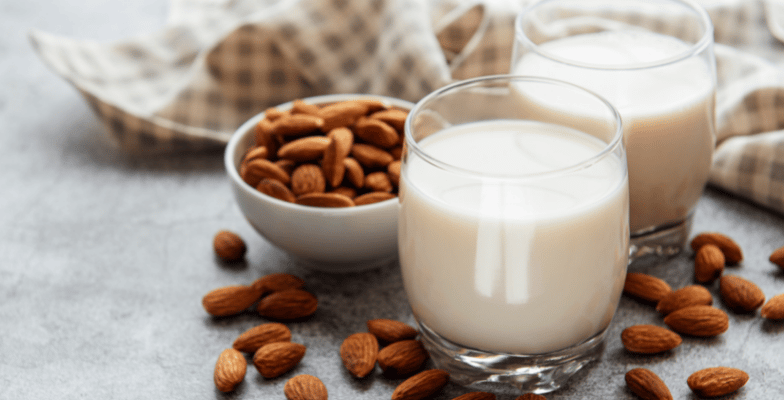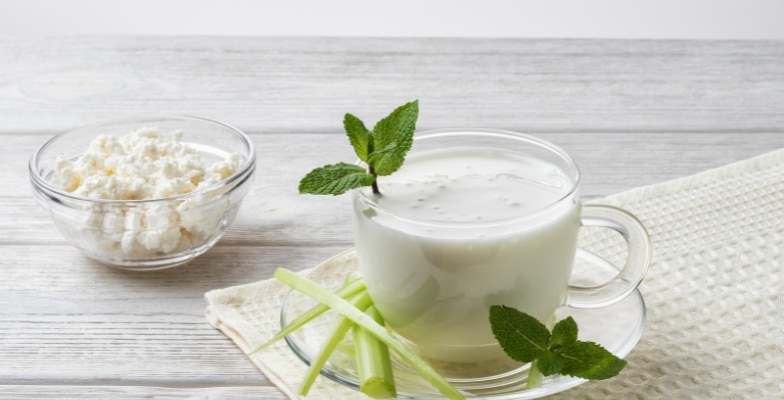Almonds Benefits For Health | How Many Almonds In A Day?
- What Is An Almond?
- Almonds Nutrition Facts
- Almonds Benefits For Health
- The Multifaceted Almond
- Conclusion

How much do we know about the tiny superfood or the king of nuts called almonds?
As a child, I remember our mother would treat us with almonds soaked in water overnight and used to say, ‘Eat it, my child; you will never get sick.’ I have continued the trend with my sons.
I knew almonds were healthy, but I didn’t realize how healthy and wholesome they were until I started researching them.
What Is An Almond?
First, almond is not a nut; it is the seed of a tree and belongs to the same family as cherries, peaches, and mangoes. 1https://en.wikipedia.org/wiki/Prunus About 80% of the world’s almond production occurs in California, as almond trees grow best in warm, dry summers.
In 2003, the US Food and Drug Administration began allowing manufacturers to label packages with a statement saying that eating 1.5 ounces per day of most nuts as part of a diet low in saturated fat and cholesterol may reduce the risk of heart disease. 2https://academic.oup.com/advances/article/10/6/1076/5523817?searchresult=1
Almonds Nutrition Facts
Almonds also contain a decent amount of calcium, copper, vitamin B2 (riboflavin), and phosphorus. Almonds have heart-protective nutrients like dietary fiber, vitamin E, selenium, magnesium, copper, potassium, and monounsaturated fatty acids.
Eating a few almonds may help prevent ailments like hyperlipidemia, inflammation, high blood pressure, high blood glucose and high insulin concentrations, and metabolic syndrome. 3https://academic.oup.com/advances/article/10/6/1076/5523817 If I described all the health benefits of almonds, the article would turn into a journal, so let’s make this short and sweet.
Almonds Benefits For Health
Almonds Reduce Cholesterol
Almonds are high in fat but in good fat. Including unsaturated fats in one’s diet has been shown to increase HDL (good) cholesterol while lowering LDL (bad) cholesterol. The American Heart Association (AHA) has a lot of research on how almonds can improve cholesterol levels. 4https://www.ahajournals.org/doi/full/10.1161/jaha.116.005162
Related: Good Fat Vs. Bad Fat: Complete List And Chart
Almonds Are Good For Heart Health
According to the Harvard Public School of Health, we have scientific evidence to suggest that the consumption of almonds 2 – 3 times a week reduces the risk of cardiovascular disease by 13% and coronary heart disease by 15%. 5https://www.onlinejacc.org/content/70/20/2519
Almonds are rich in magnesium, and studies show that a diet deficient in magnesium can raise blood pressure. 6https://pubmed.ncbi.nlm.nih.gov/10334795/ The bottom line is people who eat nuts are less likely to have heart attacks or die from heart disease. 7https://www.ncbi.nlm.nih.gov/pmc/articles/PMC5762129/
They say an apple a day keeps the doctor away. I could suggest a few almonds a day keeps the cardiologist away. 🙂 8https://www.ncbi.nlm.nih.gov/pmc/articles/PMC5946253/
Eating Almonds May Reduce Cancer Risk
Medical News published an article about an encouraging study done in 2015 on women, which suggested that adding peanuts, walnuts, and almonds to the diet could reduce the risk of breast cancer 2 – 3 times. 9https://pubmed.ncbi.nlm.nih.gov/26183374/
Almonds Regulate Blood Sugar Levels
One study suggested eating almonds had multiple beneficial effects on the glycemic index and cardiovascular risk factors in Asian Indian patients with type-2 diabetes. The results showed a significant decrease in average blood sugar levels. 10https://pubmed.ncbi.nlm.nih.gov/17116708/
Almonds Help Maintain Weight
Why would eating almonds help maintain weight, especially when they are high in fat? The answer is they are high in MUFA and PUFA (good fats) and fiber.
A study published in The International Journal of Obesity found that people who eat almonds lost more weight than those on a high-carb diet with the same number of calories. 11https://www.nature.com/articles/0802411#article-info
Almonds Are A Rich Source Of Antioxidants
Almonds are rich in vitamin E, which contains the antioxidant tocopherol, which protects our cells from oxidative damage or oxidative stress. Oxidative stress is a significant contributor to aging and disease. 12https://www.ncbi.nlm.nih.gov/pmc/articles/PMC4578028/
Antioxidants boost the immune system. 13 https://pubmed.ncbi.nlm.nih.gov/30052782/ Ongoing studies establish that a high intake of vitamin E can reduce the risk of Alzheimer’s. 14https://www.ncbi.nlm.nih.gov/pmc/articles/PMC5751107/ Surprisingly, the outer brown skin is full of antioxidants, so please do not throw it away. 15https://pubs.acs.org/doi/abs/10.1021/jf071780z
Almonds Help Improve Bone Health
Almonds are rich in nutrients like calcium, magnesium, manganese, copper, and zinc, which are essential for keeping our bones healthy. 16https://pubmed.ncbi.nlm.nih.gov/20947104/
Almonds Are Essential For Good Skin
Vitamin E and vitamin B7 (biotin) in almonds make your hair and nails grow stronger and keep your skin supple. 17https://www.ncbi.nlm.nih.gov/pmc/articles/PMC4976416/
The Multifaceted Almond
Ayurveda endorses almond and almond oil for memory loss, mood fluctuations, and skin ailments like eczema and psoriasis.
Almond Oil
It softens and soothes the skin and muscles and readily penetrates the skin to reach deeper tissues.
Almond Milk
It is a blessing in itself. In today’s world, with lactose intolerance and veganism prevalent, the demand for almond milk is growing by 14% every year. Almond milk has no cholesterol, is lactose-free, and has 0% saturated fat.
Almond Butter
It has created a niche for itself as a healthier alternative to regular butter and even peanut butter. Almond butter is dense in minerals, vitamins, and fiber.
Almond Flour
This, also known as an almond meal, is replacing regular flour, as it is protein-rich and gluten-free. The fiber in almond flour keeps the stomach full and the gut healthy.
Immature Green Almonds
These can be savored raw and preserved or pickled in some parts of the world.
Conclusion
Almonds have tapped the healthy food market as an alternative to conventional snack foods. They are available in various flavors (sweet, salted, or savory) and with different coatings (honey, barbecue, or chili). Almonds may be uncoated, roasted, or toasted and are available whole, sliced, or chopped.
Some cultures encourage soaking almonds overnight before eating them as they are much softer, less bitter, and more comfortable to digest after soaking. It may be easier to absorb some of the nutrients in soaked almonds, but we need more research to confirm this.
If you eat raw almonds, note that there’s a small risk of toxicity if you consume too many bitter ones. 18https://www.ncbi.nlm.nih.gov/pmc/articles/PMC3793392/ Most almonds found in grocery stores are sweet almonds, not bitter almonds, so there is minimal risk. People with allergies to any nuts need to avoid almonds entirely.
With all the evidence we’ve discussed, it’s clear almonds have numerous health benefits and are quintessential food!
What do you think about Almonds? Do you have any questions? Let me know in the comment below!

Skill-Based Education.
Global Recognition.
Powerful Community Building
Secure a certificate of completion in as little as a day by graduating from one of our free courses.
Get Access to Our Free Courses. No Credit Card Required.

Fabulous Body Membership
Your All-Access Pass to A Fabulous Body & A Rewarding Career
25+ Certificate Courses & Programs, All Included
15 Day Free Trial, 100% Money-Back Guarantee
About Kamini Thakar
Kamini is a very skilled writer/content creator. As a part of Fabulous Body for years, she has authored many articles really proving her prowess in acquiring and presenting knowledge about various health & nutrition topics.











Very informative.
Could not believe so much can be available on simple thing like Almond , I wud say this is Diamond
Sir , can you please throw some light on the brown peel of almonds ? Like , some experts/doctors/websites etc have mentioned that the brown peel contains “tannins” which binds with some nutrients and block their absorption . Can you please tell more on this ?
Great article. Well researched & quite informative
Great sir got to learn a lot from you..and want to learn much more…
Thanks for bringing the well-researched benefits on almonds to our attention. The information is presented is very useful for health-conscious people. Well done!
Thanks!
Farhan,
Almond skins contain a variety of phytochemicals including130 different polyphenols, which include phenolic acids, aldehydes, tannins, and flavonoids.
Polyphenols are associated with health benefits as an antioxidant, anti-microbial and anti-viral. Studies have proved that Blanching and skin removal reduces almonds polyphenol content.
Soaked almonds are considered to be easy to digest and taste better than unsoaked ones but we don’t have enough research on its health benefits.